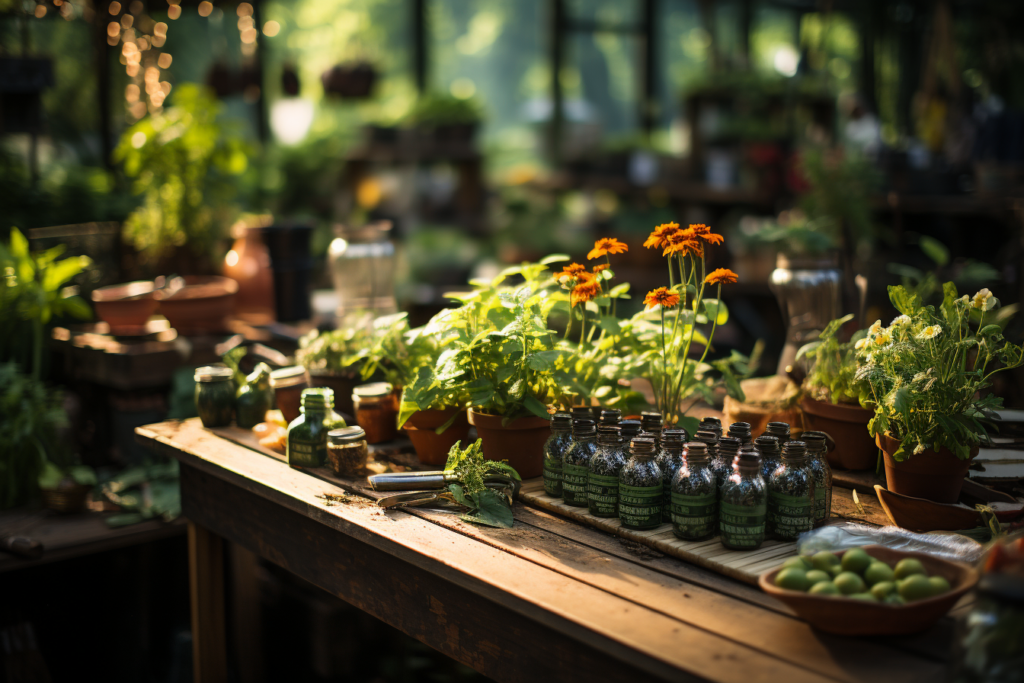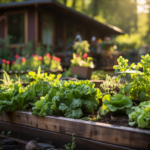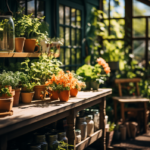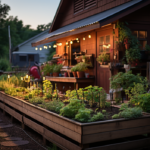Table of Contents
Discover the Top 10 Kid-Friendly Plants for Your Kitchen Garden and Watch Them Bloom!
If you’re looking for a fun and educational activity to do with your kids, planting a kitchen garden is a great idea! Not only will it give them a chance to learn about plant life and the environment, but it’ll also inspire healthy eating habits and a love of gardening. So, which plants should you choose to grow? In this article, we’ve rounded up the ten best kitchen garden plants for kids that are easy to grow, require minimal maintenance, and most importantly, are kid-friendly. From flavorful herbs to colorful veggies, these plants are sure to delight your little ones and make gardening a fun new hobby for the whole family!
The Benefits of Kitchen Gardening for Kids
When it comes to teaching kids about healthy eating and the environment, there are few activities as engaging and educational as producing your own fruits and vegetables in a kitchen garden. Some of the key benefits of kitchen gardening for kids include:
- Encourages healthy eating habits: When kids are involved in the garden-to-table process, they gain a deeper appreciation for where their food comes from and are more likely to eat fruits and vegetables.
- Promotes physical activity: Gardening is an enjoyable form of physical activity that can help improve children’s health and wellbeing while boosting their confidence and sense of accomplishment.
- Teaches environmental responsibility: By learning about soil health, composting, and other aspects of gardening, kids become more attuned to the impact of their actions on the environment.
- Develops critical thinking skills: Gardening requires planning, problem-solving, and creativity, all of which help develop important cognitive skills in children.
- Boosts social skills and emotional intelligence: Gardening can be a social activity that helps children develop teamwork, communication skills, and empathy for others as they work alongside others to achieve a common goal.
- Reduces stress and anxiety: Being outside in nature, nurturing something from seed to harvest, and having a sense of accomplishment and achievement can all have a positive impact on children’s mental health and wellbeing.
Overall, kitchen gardening is an excellent way to engage children in a fun and educational activity that promotes healthy living, environmental responsibility, and mental wellness. By introducing kids to gardening at a young age, you can help create lifelong habits that will benefit them for years to come.
Factors to Consider When Choosing Kitchen Garden Plants
Starting a kitchen garden with your kids is an exciting and rewarding project. But before filling up your space with plants, it’s essential to consider a few factors. Here are some critical things to keep in mind when choosing kitchen garden plants:
Season: Choose plants that are appropriate for the season. Planting the right vegetables and herbs will ensure that the growth is optimal.
Growing Space: Consider the size of your garden when choosing your plants. It is crucial to ensure that the plants have enough space to grow to their full potential.
Sunlight: Plants need sunlight to grow; it’s crucial to choose plants that require the right amount of sunlight based on your garden’s position and the time of the year.
Soil Type: Different plants have different requirements when it comes to soil type. Before selecting your plants, ensure that you have the appropriate soil type for their growth.
Watering Needs: Consider how much water each plant needs. Some plants require more water than others, so make sure you’re choosing plants that fit your watering schedule.
Pest Control: Certain plants are more prone to insect infestation than others. While selecting plants, consider plants that are more insect-resistant.
Fertilization: Some plants require more fertilization than others. Before choosing your plants, ensure you understand their fertilization needs to ensure they grow as best as possible.
In conclusion, consider these factors when choosing plants for your kitchen garden. Proper planning and execution will ensure that you and your kids have an exciting and rewarding experience growing their plants.
Top 10 Kid-Friendly Kitchen Garden Plants to Grow
If you’re looking to start a kitchen garden with your kids, it’s important to choose the right plants to make it a fun, educational, and rewarding experience. Here are ten of the best kitchen garden plants for kids to get you started:
- Strawberries: Sweet, small, and easy to pick, strawberries are a fun and healthy snack for kids. They’re also low maintenance and can be grown in pots or hanging baskets.
- Tomatoes: With so many varieties to choose from, there’s a tomato for every taste bud. Kids love picking and eating the juicy fruit right off the vine.
- Carrots: Known for their bright orange color and fun shape, growing carrots can be a fun activity for kids. Plus, they’re packed with vitamins and are a delicious addition to any meal.
- Radishes: Radishes are a quick-growing vegetable that are perfect for impatient kids. They’re also a great source of vitamin C and fiber.
- Peppers: Sweet or spicy, peppers are a colorful addition to any kitchen garden. They’re also packed with Vitamin C and other healthy nutrients.
- Green Beans: Growing green beans is a great way to teach kids about how plants climb and twist. Plus, they’re delicious fresh off the vine or cooked.
- Basil: Not only does basil add a delicious flavor to meals, but it’s also easy to grow and aromatic. Kids will love picking and smelling the leaves.
- Mint: Grow mint in a pot and watch it take over. Kids can pick the fragrant leaves and use them to make mint tea or add flavor to dishes.
- Sunflowers: Sunflowers are a fun addition to any garden, especially for kids. They’ll love watching the tall flowers grow and even harvesting the seeds.
- Marigolds: Not only do marigolds add a pop of color to any garden, but they can also repel pests and attract bees and other pollinators.
With these ten kitchen garden plants, you’re sure to have a fun and educational experience with your kids. Just remember to choose plants that are simple, safe, and fun for all ages!
Tips for Teaching Kids to Care for Their Garden Plants
Growing a kitchen garden is not just about planting and harvesting, but it also involves the necessary care and maintenance of plants for their optimal growth and development. Here are some tips to ensure that your kids learn how to take care of their garden plants effectively:
- Give Age-Appropriate Tasks: Assign age-appropriate tasks to your kids based on their abilities. For instance, younger ones can water plants, while older ones can weed and prune.
- Teach Proper Watering Techniques: Show your kids how to water the plants effectively without drowning them, and explain the importance of maintaining soil moisture levels for healthy growth.
- Discuss Plant Reproduction: Discuss with your kids how plants reproduce, and show them how to collect and plant seeds from the fruit or flowers.
- Encourage Creativity: Let your kids get creative by decorating their garden or pots with unique designs to make their garden space their own.
- Turn Gardening into a Routine: Turn gardening into a fun family routine by scheduling specific times to care for the garden. This will foster consistency and allow your kids to take an active role in their garden’s development.
Teaching your kids how to care for their kitchen garden plants is an essential aspect of gardening that helps develop responsibility, determination, and patience. Encourage them to get involved in the routine tasks to create healthy and happy plants in their garden. These tips will not only help keep your plants healthy but also create wonderful memories as your family enjoys the fruits of your labor.
Conclusion
Planting a kitchen garden with your kids is a great way to spend quality time together and create memories that will last a lifetime. Whether you’re working together to sow the seeds, water the plants or harvest the produce, you’re not only teaching your children valuable gardening skills, but also fostering a love of nature and healthy eating habits. By choosing the right plants and teaching your kids how to care for them, you’re giving them the opportunity to develop responsibility, patience and a deeper connection to the environment. So, what are you waiting for? Grab your aprons, gardening gloves and head outside to start your own kitchen garden adventure today!









